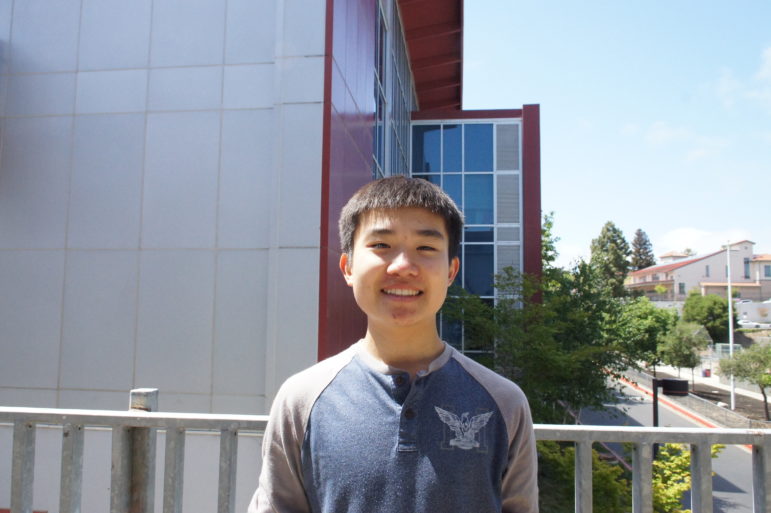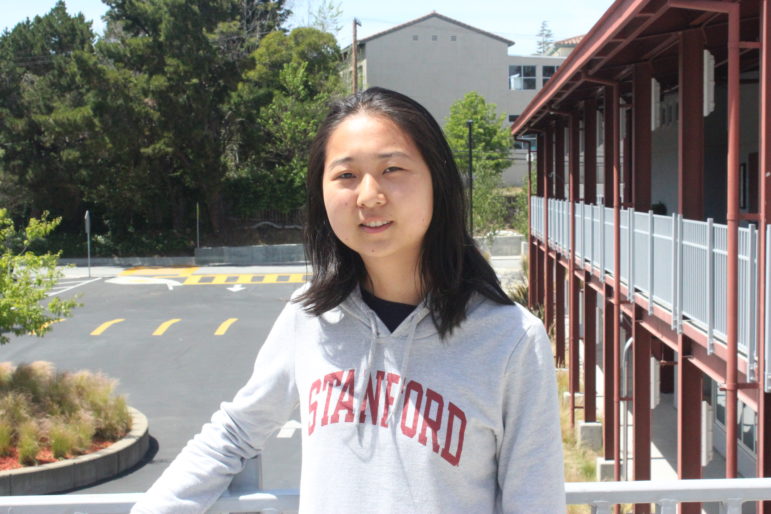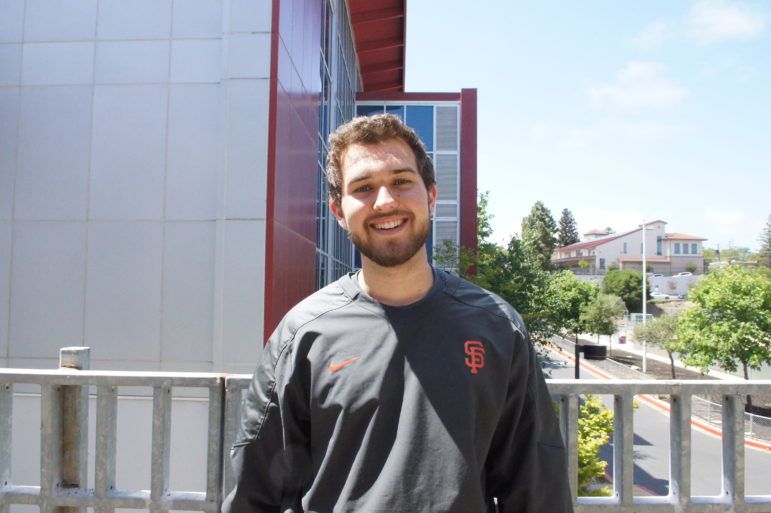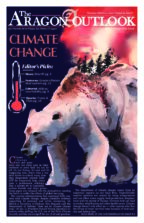Interviews by Victoria Fong, Connie Liu, Ashley Tsang and Jamie Wang
Jump to Each Student:
Maya Preston
Julia Lee
Ryan Phung
Marley Collins
Serena Lin
Lily Zhou
Serah Macias
Jordan Goldstein
Austin Lautenbach
Dante Pacini
Kinako Miyake
Maya Preston
San Jose State University
Why did you go to Middle College for your senior year of high school?
I felt like I needed a transition to college. I thought it’d be the perfect opportunity for me to become independent and get a sense of the workload. I needed a change — junior year was stressful. Middle College has really helped me get out there.
How did you know you wanted to major in psychology?
I knew that I had a knack for something social. Near the beginning of high school, I realized that I was the supporter of my friend group. I found it rewarding to give my friends the comfort they needed. Middle College helped me figure that out. It gave me more hands-on experience. It reaffirmed my passion already.
How did you pick San Jose State?
It was partially because the psych department is pretty good. But it was mostly a good school to fall back on. There are a lot of outreach opportunities because it’s in Silicon Valley. A big thing was that I got into other universities that I liked, but they were super expensive.
How do you feel about attending San Jose State, even though it was your safety school?
I didn’t expect to choose San Jose out of everything. But when I was researching it and talking to alumni, I realized I may really like it. They always have events going on.
If San Jose State were a food, what would it be?
Maybe dark chocolate. It’s supposed to be a really rich environment. There’s a lot going on in the area and on campus. There’s a lot of depth. Also sweet because the people seem friendly. I’m already in a GroupMe and Facebook group.
Julia Lee
University of California, Los Angeles

Why did you choose UCLA?
Besides it being kind of my dream school, they have pretty much one of the best nursing programs for undergrad in California. I went to a nursing school orientation and I really fell in love with the program and support that the nursing program gave especially since they only accept 40 freshmen, so it’s a small family inside this huge school. I also really like the school spirit that UCLA has as well as the location, which is far enough, but not too far from home.
Why did you decide to pursue nursing?
I volunteer at the Mills Peninsula Hospital in the Family Birth Center so I get to kind of shadow the nurses around and see what they do. I really liked the fact that nurses had so much patient interaction, even more than doctors do and that they still had the same science and biology based academics which I really wanted.
Ryan Phung
University of Southern California

How did you decide you wanted to major in music?
I decided I want to major in music because I’ve been playing music for a long time and it sounded like the right thing to do. And, a lot of my classes at school are also music.
How did you end up choosing USC?
It was either conservatory or college. I talked to a lot of teachers and a lot of my teachers actually went to conservatories and they didn’t have the best experience. Also, I just don’t want to learn just music, I wanted other things too. Conservatories for music, you just drop all your GE classes and focus on music. It’s a lot smaller than a college. So you’re going to be with the same 50 people for four years. I think what it boiled down to was location. There’s a great studio recording scene there. You could play in a soundtrack for commercials and movies.
What was the audition process like?
The audition process was different than everyone else’s applications. A lot of recordings have to be done during the summer, like junior year going into senior year. During summertime you already have to be recording. They give you what songs they want you to play and record it. That’s just to get into the audition and then if you get a call back and they’re like, ‘Oh, you got into this audition.’ Then you go to the actual campus and audition live or if you can’t travel they always have regional audition.
Marley Collins
Gap Year/Lewis and Clark College
What do your plans for the future look like?
I’m taking a gap year to pursue music because I really like music and ideally music would be my profession. So my plan is to major in environmental studies in college so at least I have a major in something practical. I’m probably going to focus on the more political part of it. So that’s kind of like the backup plan to music.
How are you planning on pursuing music?
So I’m planning on moving out once I turn 18 in September and I’m going to move. Also this summer, I will be working a full time job to save up money and stuff but I will also be, in the evenings, going to open mics and doing some recording of music and doing some shows and stuff. And then when I move out, I’m thinking I’m going to move to either Seattle, Washington or Austin, Texas, or Oakland because those three cities have great music scenes and they’re also a bit cheaper than San Francisco.
Is there a certain thing that inspired you to take this route?
Well for a while, when the college application process was just starting I was like, “I don’t even know why I’m going to college. I don’t want to go to college” and so it was kind of a happy medium where I get a break from school and I kind of get to decompress because I think that if I were to go straight into school next year without taking a gap year I would just probably fail my classes and drop out because I am so burnt out. It’s like a much needed break and it’s also an opportunity to at least try music a little bit and see what it’s actually like.
What kind of music do you play?
It’s kinda like folk rock or Indie rock, its guitar and stuff like that.
What genre of music would Lewis and Clark be?
It would probably be like folk rock or indie rock.
Sarena Lin
U.S. Army
What are you planning on doing in the army?
I’m signed up as a combat medic … basically it’s like a doctor in the field. My training starts a month after we graduate.
How long is your training?
The basic training, the job training and … doing airborne, [in which] you learn how to jump out of planes, I think is about a half year.
What led to your decision to enlist in the army?
Honestly, I really like a challenge both [physically and mentally,] but on the other hand, the benefits are awesome — I get free college.
How long are you planning on staying in the army?
My contract is four years, but after that I’m not sure. I’ll have to see how I like it.
Are you interested in medicine?
Yeah definitely. I think the training I get in the army, so lets say after four years I don’t want to [continue with the military], I’ll still have a lot of experience, and so if I want to go the doctor route, I’ll still have a lot of experiences that will just benefit me in the long run.
When did you decide that you wanted to be in the military?
When I was in sophmore year I started training with some of the recruiters, and I just really liked it. There a couple times, actually, where we’ll go on hikes, but we’ll carry like a heavy rucksack anywhere from 45 to 50 pounds and, carrying the rucksack, I just really liked it. It was tiring, but at the same time it’s the kind of thing that I want.
How do you feel about going into the military as a female?
I think that it’s a lot of weight on my shoulders, but … in the recent years there are a lot more opportunities and there a lot more programs that are now available for females . . . My recruiters have told me that, especially with some of the senior members of the military, they might still be a little biased, so going in as a so-called minority makes me feel like I have to prove them wrong, so it just give me a bigger challenge.
Lily Zhou
Stanford

What are you planning on majoring in?
Tentatively English. Right now, I’m not too sure about my future career as anEnglish major, but English is what I want to do right now. I’m thinking about working in publishing. Media or journalism possibly, but I’m not too certain. I know that Stanford is known for computer science so I feel the need to take advantage of that, but I definitely need to take more classes and do more research in order to consider it as a viable career option.
Why Stanford?
Stanford is very close to home, I’m very comfortable in the environment that it’s in, and I’m familiar with its culture. Stanford is pretty strong in its English program and has professors and scholars there that I’d be so thrilled to work with.
How did you become interested in writing and poetry?
When I was younger, I always loved stories in general, loved reading stories and novels. It wasn’t until high school that I wanted to write stories for myself. Sometime during sophomore year, I started writing poetry and it was an unconventional form of storytelling. In the beginning, poetry was a solitary thing — I did it for myself.
If Stanford was a style of writing, what would it be?
Stanford is very interdisciplinary — it’s very science plus humanities. If it were a form of creative writing, it would be a science fiction novel. Stanford strikes me as a very innovative place that seeks to discover new things.
What are some challenges you see yourself facing there?
So many people are so talented and amazing, and I can see it as a source of stress. I haven’t experienced that yet since I’m not at Stanford, but something that I remember is that one person’s success doesn’t equate to my failure and I tell myself to not get drawn too much into competition. Writing in it of itself is sort of a stress reliever and definitely helps me sort through the things going on in my life. Even if I do decide to major in something that isn’t English, writing is life-long and will continue doing no matter what, even if it isn’t a professional career. Writing is the one thing I can’t divorce myself from.
Serah Macias
CSM/Police Academy
Why did you choose to go to CSM?
I never really thought why I wanted to go to CSM, I guess it’s just convenient to be there, it’s close.
How did you decide to be a probation officer?
At first I wanted to be a probation officer for quite some time. But I kind of switched gears this year and decided to be a police officer. I felt like it would be more fitting to who I am. I’ve always been a very helpful person; I like to be there for other people when they need me.
What is your inspiration for this route?
I wouldn’t say there is a specific reason, but I think I’m sort of interested in entering a male-dominated career. I want to tackle that on.
What led you to want to be a police officer?
I’m a very indecisive person so once I become a police officer, I’m fortunate that the career itself is like a big umbrella. If I wanted to switch gears I would have already had some training to become a correction officer or perhaps a probation officer if I wanted to go back to it.
What does your path ideal look like?
I would get an associate’s degree, I could transfer to four years if I wanted to, but I want to start [police training] as soon as possible. So after I get my associate’s degree at CSM, I would start at the police academy.
Would you want to stay in the Bay Area?
I sort of haven’t decided where I want to go, but definitely somewhere with a lot of action. I was thinking maybe San Jose, the city, maybe Oakland if I’m brave enough.
What snack would your career choice be?
Sour Patch Kids, because I know that there will be bitter and sweet times but I’m prepared for it.
Jordan Goldstein
CSM
What do your future plans look like?
I’m getting my degree in construction engineering. I’m going to CSM to do general ed and I’m going to maybe UC Santa Barbara or UC Davis.
What inspired you to do construction?
I’ve just always liked building. Honestly, it started in middle school, kind of doing a shop class over the summer. I just loved working with tools. I just followed that into high school and jobs over the summer.
Will you be staying local after college?
I feel like it’s kind of difficult to stay local unless I’m going to do like a private contracting business on my own. I think probably what will end up happening is I will have to travel around the country working on projects with companies.
What tool would CSM be?
It would probably be some sort of measurement equipment, because CSM is a stepping stone to actually getting into the college I want to go to, which will then lead to the job. And the first thing you always have to do on every job is to measure, to make sure everything’s right to proportion.
Austin Lautenbach
Cal Poly San Luis Obispo

How did you know you want to major in engineering?
My uncle, father, and cousin are engineers. I’ve always aspired to be like them. It matches my personality. Engineering is often a group effort and requires collaboration. I have had an interest in materials engineering through Boy Scouts and hobbies. Last summer, my father and I bought an old wooden canoe off of Craigslist. It had a leaking problem. We spent the summer patching it up, working with different materials.
What is materials engineering?
The materials part is discovering and having a deep knowledge of materials. Most people have a specialization, like metals, wood, plastics. The sort of jobs you can go into are endless — pharmaceuticals, aerospace, hardware design. I’m interested in going into pharmaceuticals.
How did you weigh Cal Poly’s engineering school versus the school as a whole?
There are all types of rankings. There are so many criteria. But the best way to judge a school is to talk to students, go there and get a feel. That’s not something a statistic can measure. What’s not important to me is the statistical spreadsheet, but the feel of the school. The personal feel of Cal Poly was fantastic for me. The faculty cares about students. The head of materials engineering knew every student’s name, and I want that kind of attention. There are about 120 people total in the entire major. It’s one of the smallest engineering majors.
Dante Pacini
University of North Dakota
How did you get into piloting?
Well, I have always liked aviation since I was a little kid, and I’ve always been interested in planes. And then in my sophomore year, I was looking at internships because aviation is very expensive. I came across a San Carlos Flight Center that offers an upland scholarship . . . it is a full scholarship, and they will give you all the funds to complete your training, they will train you at the Flight Center and you have your own CFI, and you train with your own plane and you receive and by the time you’re done with the nine-week course you are private pilot. . . I have my pilot license and so the little planes that you see flying in the sky, that’s the planes I fly.
So what do your plans for the future look like?
I’m going to the University of North Dakota, and I plan on studying commercial aviation where I will get all of my ratings to become a commercial pilot and hopefully when I graduate at 23 or 24, I should be a commercial pilot.
What inspired you to take this route?
I would say some of the teachers here have definitely helped inspire me and look for the scholarships. Actually, Ms. Ward was the one that initially found the scholarship, and she connected me to a past winner and also just some of the pilots that I met hanging around San Carlos Airport and meeting people at the San Carlos Flight Center just a lot of pilots have inspired me to become one.
If you had your own plane, what would you name it?
Probably Deborah or Debbie. That’s my mom’s name and she’s been a huge inspiration for me and she’s been really helpful with everything, and I mean it’s just a stressful time training. So I think I would name it after my mom or probably my grandma. I would probably get a SR22, it’s a little low wing. It’s a state-of-the-art airplane with a whole bunch of like nice instruments and really fast and really agile, its awesome.
Kinako Miyake
Pratt Institute
What inspired you to choose your major?
I decided to choose industrial design as my major because I was interested in creating everyday objects more useful and entertaining. I enjoyed to solve problems and use my creativity to solve them.
How does the school you chose meet your requirements?
Pratt Institute is one of the most prestigious art and design schools. If I were to become a designer, I knew I needed to be at the top. Mediocre doesn’t do anybody good in this industry if you want to succeed. So I wanted to challenge myself, and I knew Pratt had those challenges such as being far away from home and a competitive environment. I also knew New York is a great place to be influenced by great designers.
Is there anything special that you did to get into Pratt?
My portfolio was unique. I had a variety of media which may have helped show my potential to the admissions office. I also contacted the basketball coach, and they may have helped my admissions because they could recommend people to them. But they mainly look at your portfolio to consider your admission so I was admitted because of my portfolio. I also received the Presidential merit-based scholarship because of my scholarship, so it’s important to have a great portfolio.
What color or type of design would Pratt be?
I think it would be rusty red because it’s an old school. It used to be an engineering school, so I somewhat associate rust with engineering.

